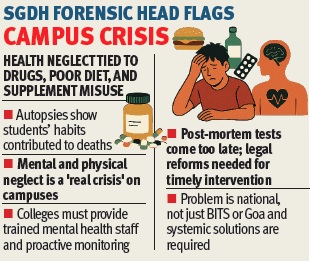Forensic head says only 2 of 5 were suicides, cites mental health gaps as key factor in campus fatalities

MARGAO
In a significant development, Dr Madhu Ghodkirekar, Head of Forensic Medicine at the South Goa District Hospital in Margao, stated that the death of a 19-year-old student at BITS Pilani, Goa, on September 4 cannot be classified as suicide, but rather as a case of health neglect.
Dr Ghodkirekar revealed that of the five student deaths at BITS Pilani, Goa, only two were confirmed suicides. The remaining three, including the most recent case, are still under investigation. He emphasised that these deaths cannot be definitively classified as suicide or accidental until further examination of medical and forensic reports is complete.
“Of the five deaths at BITS Pilani, two were by hanging. The remaining three, including the latest, do not fit the standard definition of suicide at this stage,” he stated.
The forensic expert expressed growing concern over a pattern of health neglect among students at premier professional institutions, often stemming from drug use, poor dietary habits, and excessive reliance on health supplements.
He said his interactions with the health support staff, police, and the parents of the deceased students studying at the professional institution have revealed aspects of health neglect. “In the previous case, it has come to light that health tonics were used. We came across cans of health tonics and protein supplements. These tonics and supplements can have their own health complications. During the autopsy, we noticed that their health habits had affected the deceased,” he added.
Mental neglect a major concern
Calling mental and physical health neglect the “real crisis” on campuses, Dr Ghodkirekar urged for a complete revamp of mental health support systems in educational institutions across the State.
“It is not enough to claim that mental health support is available. These systems must be staffed with well-trained, specialised paramedics and therapists capable of addressing the complex challenges today’s students face,” he stressed.
Dr Ghodkirekar also flagged the lack of proactive health monitoring in institutions, recommending that colleges implement regular health check-ups and introduce protocols for immediate testing when students are found unconscious or unwell.
“We currently conduct blood tests only after death, but by then, the damage is irreversible. There must be a legal and ethical framework to allow timely intervention. Without consent, we cannot test blood samples while the student is alive, even if they are unconscious. That must change,” he said, adding that this issue extends beyond one institution or one state.
“This is not just a BITS Pilani problem, or even just a Goa problem. It’s a national issue affecting campuses of higher learning. We need systemic solutions to the growing issues,” he asserted.